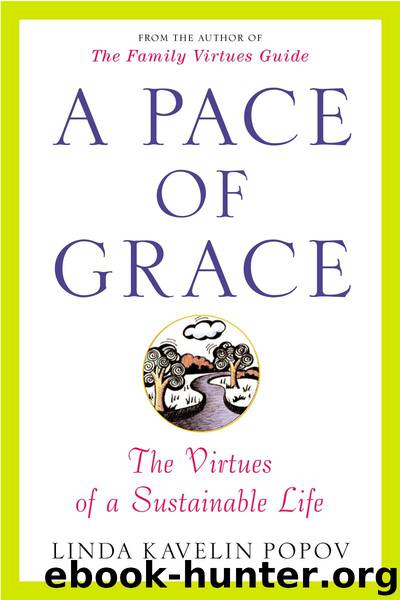A Pace of Grace by Linda Kavelin Popov

Author:Linda Kavelin Popov
Language: eng
Format: epub
Published: 2018-12-18T16:00:00+00:00
PURGING OUR GUILT
At a women’s seminar I had given years before, a young mother of three expressed shock at the notion of taking time for daily personal reflection. I had just finished saying that everyone needs a routine of reflection, a daily time set aside to rejuvenate and restore. (This was one practice I have always protected as part of my own self-care.) She raised her hand and said, “But isn’t that selfish?” “What troubles you about being selfish?” I asked. She spluttered, “It, just, would be . . . selfish ! What about the rest of the family? I can’t afford to take time for myself.” I remember thinking, “Honey, you can’t afford not to take time for yourself. If you don’t, how soon will you begin resenting all this ‘sacrifice’ for your family?” I proceeded to give her several practical reasons for the fact that “You can only give fully to others when your own cup is full.”
Don’t you find the word “self-ish” an interesting one? It is not merely a word describing what pertains to the self. It is heavily loaded with negative connotations. “Boyish” simply means youthful and boylike. “Foolish” means acting like a fool. “Selfish” implies that to focus on the self is somehow sinful and inappropriate. “Unselfish” or “selfless” implies one who has the virtues of consideration, generosity, and a willingness to meet the needs of others while sacrificing one’s own needs in the process.
One of the gifts I received from my illness was that it brought me face-to-face with my own demons of self-neglect and abuse in the name of service. I realized I had grown up with the subtle message that I am here only to serve others and that the greatest sin is selfishness. I believe this message is particularly part of the raising of girls. Many of us, in our growing-up years, watched our mothers catering to the males in the family. The messages our parents sent us during our childhoods were “Children are to be seen and not heard,” “Don’t cry or I’ll give you something to cry about,” “Keep a stiff upper lip,” “Don’t be so selfish,” “Think about the starving children in Armenia.” I never did get why my eating my peas was going to help those children across the world.
I am an assertive woman and am not afraid to ask for what I need, so I was shocked to realize that I felt so undeserving. I had stranded myself in a desert of neglect, convinced I was just too busy for self-care. I had not paid attention to my own body. I had not asked myself for what I needed.
During my initial experience of post-polio I could hardly move, so I had lots of time to reflect. Gradually, I discerned a subtle egoism in the “unselfishness” of the busy martyr role, the insidious pull to sacrifice my health out of an inflated sense of self-importance. This elusive understanding dawned as, more and more, I experienced the freedom of detaching from the undone tasks, of listening to my body first.
Download
This site does not store any files on its server. We only index and link to content provided by other sites. Please contact the content providers to delete copyright contents if any and email us, we'll remove relevant links or contents immediately.
| Acupuncture & Acupressure | Aromatherapy |
| Ayurveda | Chelation |
| Chinese Medicine | Energy Healing |
| Healing | Herbal Remedies |
| Holistic | Homeopathy |
| Hypnotherapy | Massage |
| Meditation | Naturopathy |
| Reference |
Inner Engineering: A Yogi's Guide to Joy by Sadhguru(6785)
The Power of Now: A Guide to Spiritual Enlightenment by Eckhart Tolle(5748)
Fear by Osho(4727)
Ikigai by Héctor García & Francesc Miralles(4246)
The Art of Happiness by The Dalai Lama(4125)
The Ultimate Bodybuilding Cookbook by Kendall Lou Schmidt(3935)
Yoga Therapy by Mark Stephens(3742)
The Little Book of Hygge by Meik Wiking(3681)
The Healing Self by Deepak Chopra(3568)
Why Buddhism is True by Robert Wright(3446)
The Hatha Yoga Pradipika (Translated) by Svatmarama(3325)
Being Aware of Being Aware by Rupert Spira(3272)
Shift into Freedom by Loch Kelly(3193)
Wild Words from Wild Women by Stephens Autumn(3148)
Work Clean by Dan Charnas(3115)
Happiness by Matthieu Ricard(3040)
More Language of Letting Go: 366 New Daily Meditations by Melody Beattie(3018)
Yoga Body & Mind Handbook by Jasmine Tarkeshi(2874)
Why I Am Not a Feminist by Jessa Crispin(2747)
